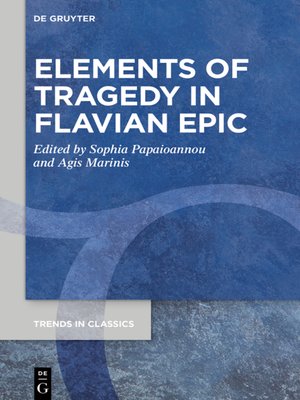Elements of Tragedy in Flavian Epic
ebook ∣ Trends in Classics--Supplementary Volumes
By Sophia Papaioannou

Sign up to save your library
With an OverDrive account, you can save your favorite libraries for at-a-glance information about availability. Find out more about OverDrive accounts.
Find this title in Libby, the library reading app by OverDrive.



Search for a digital library with this title
Title found at these libraries:
| Loading... |
In the light of recent scholarly work on tragic patterns and allusions in Flavian epic, the publication of a volume exclusively dedicated to the relationship between Flavian epic and tragedy is timely. The volume, concentrating on the poetic works of Silius Italicus, Statius and Valerius Flaccus, consists of eight original contributions, two by the editors themselves and a further six by experts on Flavian epic. The volume is preceded by an introduction by the editors and it concludes with an 'Afterword' by Carole E. Newlands.
Among key themes analysed are narrative patterns, strategies or type-scenes that appear to derive from tragedy, the Aristotelian notions of hamartia and anagnorisis, human and divine causation, the 'transfer' of individual characters from tragedy to epic, as well as instances of tragic language and imagery.
The volume at hand showcases an array of methodological approaches to the question of the presence of tragic elements in epic. Hence, it will be of interest to scholars and students in the area of Classics or Literary Studies focusing on such intergeneric and intertextual connections; it will be also of interest to scholars working on Flavian epic or on the ancient reception of Greek and Roman tragedy.
Among key themes analysed are narrative patterns, strategies or type-scenes that appear to derive from tragedy, the Aristotelian notions of hamartia and anagnorisis, human and divine causation, the 'transfer' of individual characters from tragedy to epic, as well as instances of tragic language and imagery.
The volume at hand showcases an array of methodological approaches to the question of the presence of tragic elements in epic. Hence, it will be of interest to scholars and students in the area of Classics or Literary Studies focusing on such intergeneric and intertextual connections; it will be also of interest to scholars working on Flavian epic or on the ancient reception of Greek and Roman tragedy.






